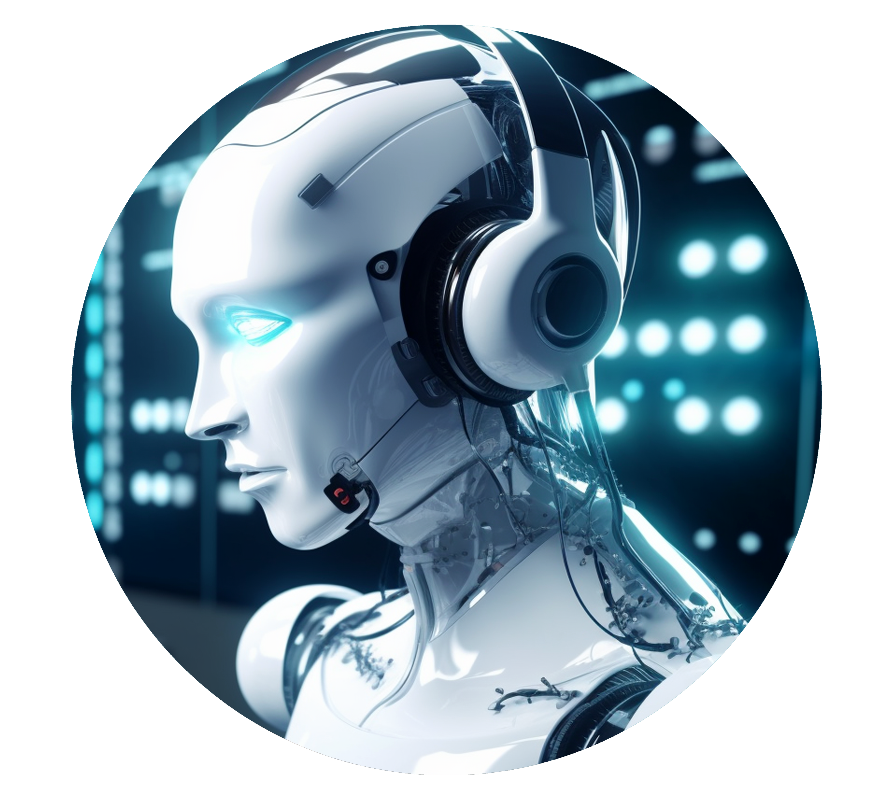
Contact Center AI is AI that is integrated with your call center software to help optimize the performance of your contact center. AI can be integrated with your call center software to perform tasks like agent assistance, real-time sentiment analysis, interaction automation, and customer self-service. AI is a great way to supplement your call center to boost agent efficiency and deliver better customer support. AI is a necessity for any call center looking for digital transformation in their CX delivery.

AI functionality can be used in a number of ways to improve CX. There are many potential use cases and benefits of contact center AI.
One of the best ways that AI is used to improve customer service is through agent assistance. AI can be used to supplement the productivity of call center agents through real-time assistance. This is done through automatic suggested responses, real-time customer sentiment analysis of customer mood, and more.
Another way AI is used to improve the customer experience is through self-service. This is done through the use of a conversational interactive voice response. Conversational IVR solutions allow the customers to use their own spoken voice to navigate through IVR options on a voice call, delivering a more personalized experience. This is done through conversational AI that can translate speech into text through a speech analytics solution.
Next, AI technologies are great for automatic call distribution and call routing.
Last but not least, AI improves CX by automating repetitive tasks in the call center. Tasks that can be automated include automated conversational IVR password reset and customer information gathering, which can free up live agents to work on more pressing tasks.
One of the best use cases for artificial intelligence in your CX is through implementing self-service. Self-service is great for improving operational efficiency by allowing callers to communicate with virtual assistants.
Implementing a self-service system can help reduce wait times, reduce call abandonment, and improve average handle time by lowering the amount of incoming customer calls that go into the call queue. Interactive voice response IVR delivers options through the phone for callers, allowing them to choose where to go with their personal voice. Through Natural Language Processing, or NLP, customers can use their natural voice to navigate the menu and continue the customer journey without a long wait.
Implementing a conversational IVR as part of your contact center solution can be easily done with the right vendor. Bright Pattern is one of the best contact center platforms that utilizes plug-and-play APIs to easily integrate AI tools and AI platforms into your call center operations.
Bright Pattern can integrate with AI solutions from Microsoft, Google DialogFlow, and IBM Watson. Integrate the power of AI to deliver a better customer service experience. Bright Pattern easily allows your cloud contact center to get voice responses from the customer through Microsoft, Google DialogFlow, and IBM Watson, and use these responses to direct the call to the right resource through your IVR systems.
Generative AI is a form of AI that can produce content or get content from the internet, such as text, images, audio, and data. Generative AI is one of the latest forms of development in the AI space. Generative AI continues to improve through machine learning, and technologies like ChatGPT show just how useful this technology can be to our everyday lives. This is no different in the contact center industry, where contact centers AI has the potential to make a huge impact.
The main benefit that generative AI in customer support is that it can deliver is through the analysis of conversations for context. Through analysis, the AI can generate coherent and appropriate responses to help handle customer inquiries and requests. AI-powered contact centers allow agents to be assisted with suggested responses, real-time sentiment analysis, and more.
AI is changing the way agents interact with customers by allowing them to more quickly respond to customers by selecting suggested responses and allowing agents to gauge customer mood.

AI can be utilized to help supplement the performance of contact center agents by assisting agents during customer interactions. Human agents can be supplemented by AI call center technology
Real-time automation in the call center is achievable through the use of contact center AI, or CCAI. CCAI can help automate repetitive tasks in the contact center to reduce the need for human resources in your CX operations. Automation, while reducing the need for human resources, is still just as accurate and consistent as a live human agent.
Some examples of automation in the call center include:

Chatbots are a critical part of modern customer engagement. Chatbots can be used as a first-line for customers who self-service first before seeking the help of a live agent. By integrating chatbots with an effective CRM system, chatbots can provide self-service and allow customers to resolve their resolutions without having to speak to an agent.
Chatbots powered by powerful artificial intelligence AI and integrated CRMs are powerful tools that can act as virtual assistants to help supplement agents, lower call queue times, allow customers to resolve issues on their own, and personalize the customer experience spending on how dynamic the AI is.
AI can power efficient omnichannel call routing by providing a powerful algorithm that can help quickly determine the best place for the call to route to. Have customer issues be routed to the right agents or the next best agent more efficiently, especially during periods of high call volumes.
There are different types of routing that can be done with AI, including:
Implementing call center AI solutions can help improve key metrics in your CX operations. AI technology can help improve KPIs such as:
These metrics can be obtained through deploying call center analytics, which can be easily obtained through both implementing an omnichannel platform and implementing AI software solutions. Discover key metrics without doing time-consuming labor by allowing AI to read and analyze call transcriptions for great insights into your CX operations.
Integrations with various call center technology is a great way to improve CX and agent performance in your call center. Some critical integrations you should have for your contact center include:
Bright Pattern’s contact center platform integrates easily with any third-party software, including your own natively-built record management system. Bright Pattern also integrates with any third-party CRM system, like Microsoft Dynamics, Salesforce, Zendesk, and more.

To provide the best possible customer experience, your AI-driven call center solutions need to have other key features. Here are some of the key features your AI contact center needs:
Omnichannel communications is one of the best ways for your call center to improve customer conversations and better meet your customer needs. Advancements in omnichannel technology beyond just a business phone system have allowed companies to communicate seamlessly with customers on all channels including:
Omnichannel contact center solutions allow live agents to better connect with call center customers on all traditional and digital channels, and allows the conversation to switch between channels while the agent has the conversation context at the tip of their fingers. This creates a frictionless customer journey that doesn’t need to stop.
Provide a more digital experience during customer interactions and improve agent performance with an omnichannel communication platform to go with your AI call centers.
There are currently many AI tools from various providers that are available to contact centers. These tools include Google Cloud AI, Microsoft AI, and IBM Watson.
Tools like Google Cloud AI and IBM Watson can be utilized to power many key tools that CX providers can utilize to deliver a better experience. This includes functionality like agent assistance, speech analytics for conversational IVRs, suggested responses during CX interactions, sentiment analytics, and much more.
Some call centers currently experiment with advanced forms of AI from providers like Google Cloud AI, Microsoft AI, and IBM Watson for potential use cases. Another popular AI tool that is being experimented with is ChatGPT. These AI tools are being used for purposes like quality management, agent assistance, and more.
While these use cases are cutting-edge and are being experimented with, there are actually some basic forms of automation and artificial intelligence in your call center right now. Here are some examples of how call centers use intelligence and automation to improve the client experience today:
AI, or artificial intelligence, can be used with great effect in customer service. AI provides the opportunity to implement self-service, improve agent efficiency, and automate routine tasks, allowing your call center to become more efficient and focus on providing a better experience to customers.
AI tools and integrations with best-of-breed AI like Google Cloud AI, Microsoft AI, and IBM Watson have many benefits for customer service, including:
AI is one of the most powerful tools for call centers to use, and provides limitless automation capabilities. With developments like Google Cloud AI, ChatGPT, Microsoft AI, and IBM Watson, it seems as though AI could be taking over. And eventually, AIs can take over call centers and call center agents.
However, this is far from true. AI is best designed to be used in conjunction with live agents. This is because live agents provide a personalized, human-touch to interactions that AI can’t. While AI can provide self-service capabilities and can be used to replace certain automated conversations, live call center agents provide a personalized human-touch to the customer experience that is extremely important for every business, whether it’s a small business or large enterprise.
AI may not be taking over call centers any time soon, but it is still an important tool to be used in conjunction with your call center agents to boost performance, productivity and efficiency.